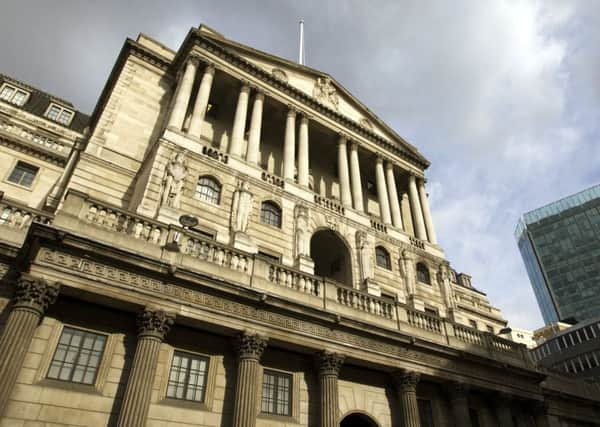Bill Jamieson: It's far too early to break out the bubbly


The numbers bore out business surveys showing a greater degree of optimism than the dismal GDP numbers for the final quarter of 2016 suggested.
“This is a huge sigh of relief for our economy,” said SCC chief Liz Cameron. “The most significant contributor to this recovery has been the production sector and this reflects the positive signals that we have been detecting from Scotland’s manufacturers over recent months and, indeed, the returning signs of confidence from the oil and gas supply chain.”
Advertisement
Hide AdAdvertisement
Hide AdWith plaudits like this, you’d be forgiven for thinking that our economic woes are now behind us and that we can confidently expect further improvement in the months ahead.
But with the relief came a lengthy “to do” list and reminders that Scotland’s annualised growth rate is still well below that for the UK overall and also below the long-run average of two per cent growth.
Just when we thought we had been offered a flute of champagne, it turns out to be a watery dandelion and burdock. Inverness-based economist Tony Mackay, usually the most optimistic of Scotland’s independent economic forecasters, sees growth rising from 0.6 per cent in 2016 to just 1.7 per cent in 2019.
The main problem, he says, is the ongoing recession in the North Sea oil and gas industry, following the collapse in world oil prices from $115 a barrel in 2014 to about $50.
“That has had a serious negative impact not only on the Aberdeen economy but also on the supply chain elsewhere in the country. In addition, some other industries have been struggling, notably in the public sector because of the ongoing cuts in public expenditure.”
As worrying for our immediate prospects was disappointing UK-wide business survey data last week. For construction, the Markit/CIPS purchasing managers survey showed expansion slowing last month after spiking to a 17-month high in May. The headline index fell back to 54.8 after a jump to 56.0 in May from 53.1 in April. The survey, says EY Item Club chief economic adviser Howard Archer, “points to the economy faltering in June as heightened political uncertainties have fuelled business and consumer caution.
“A slowdown in new orders growth to a three-month low pointed to construction activity losing momentum going into the third quarter and this was reflected in confidence in the sector relapsing to a 2017 low.”
Nor was the news any brighter on manufacturing. Latest Office for National Statistics data shows UK output fell unexpectedly in May, hit by a drop in car production. Output fell by 0.2 per cent compared with April, with car production down by 4.4 per cent – the biggest fall since February last year.
Advertisement
Hide AdAdvertisement
Hide Ad“It’s all building up a pattern here that says the economy is clearly losing momentum,” says Peter Dixon, an economist at Commerzbank.
“It’s not pointing to a particularly dynamic second quarter. Under those circumstances, the timing of the hawks on the Monetary Policy Committee pushing for a rate hike doesn’t look great.”
As for hopes that the fall in the pound since the Brexit vote would help improve our trade figures, separate data from the ONS last week showed that the deficit widened in May.
The UK’s total trade deficit in goods and services widened by £1 billion to £3.1bn between April and May following an increase in imports from non-EU countries and a fall in the export of services.
And in the three months to the end of May, the deficit widened from £6.9bn in the previous quarter to £8.9bn. The fall in the pound after the Brexit vote has driven up the cost of imports, which has helped to push up inflation.
And overhanging all of this is the fall in real household disposable incomes at their steepest rate since 2011: the amount that families have to spend – after tax and benefits are taken into account – fell by two per cent in the first quarter compared to 2016.
So, with these gathering clouds ahead, all the more reason to heed the advice from Scotland’s business lobbies. “We must ensure,” says Cameron, “that we are seen to be the best place in the UK to do business and that will require a fundamental reassessment by the Scottish Government of its tax policies.”
She says the forthcoming publication of the report of the Barclay Review of Business Rates “must rapidly be translated into fairer and lower business taxes in Scotland in order to reduce the business cost base.
Advertisement
Hide AdAdvertisement
Hide Ad“Scotland’s businesses are still facing headwinds from rising prices and falling domestic spending power, which could hamper demand and threaten future growth. It is notable that the UK government’s deal with the DUP promises an examination of the impact of VAT on Northern Ireland’s tourism industry, and it is time to broaden the scope to include Scotland in order to provide a further boost to the global marketability of this key business sector.”
And from Andy Willox, Scottish policy convener of the FSB comes a “to do” list of no less than seven areas for action. “We need,” he declares, “to get the country on a much stronger economic footing.”
The FSB list includes guaranteeing the rights of EU nationals; repairing and rebuilding local infrastructure – “about a third of Scotland’s local road network is in a substandard condition, while our digital infrastructure (mobile and broadband) is poorer than England’s by every measure”; a review of City Deals and the appointment of business champions; a ruling out of tourism taxes and any new tax grabs on the self-employed by the chancellor.
Out of the woods? Not by any measure.